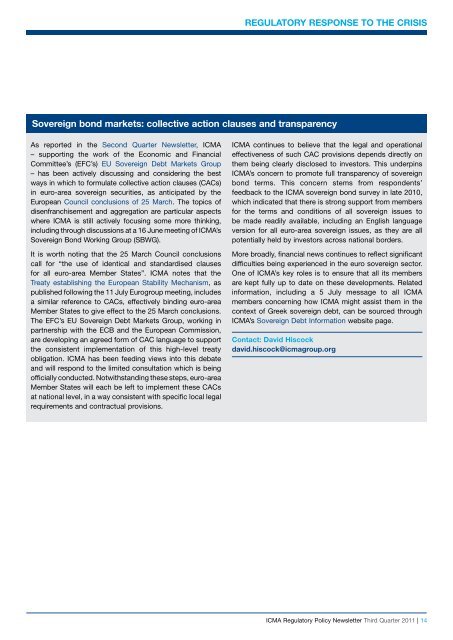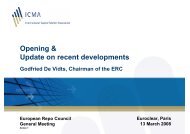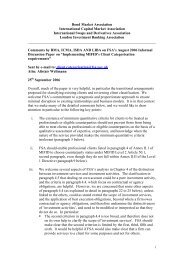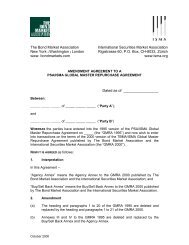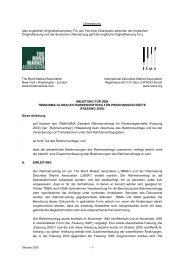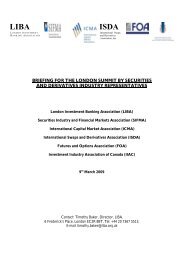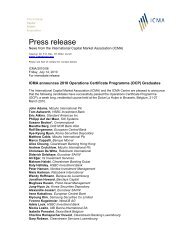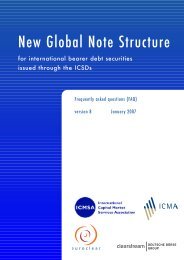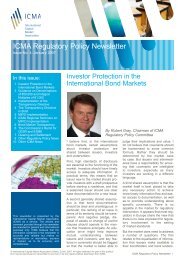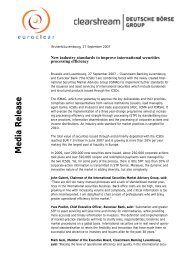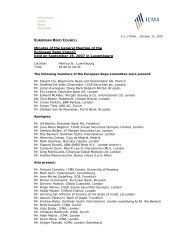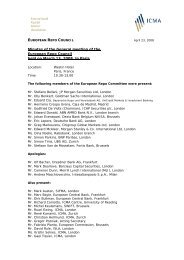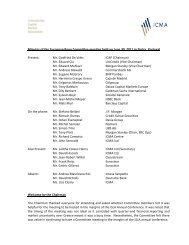Issue no. 22: ICMA Regulatory Policy Newsletter
Issue no. 22: ICMA Regulatory Policy Newsletter
Issue no. 22: ICMA Regulatory Policy Newsletter
Create successful ePaper yourself
Turn your PDF publications into a flip-book with our unique Google optimized e-Paper software.
REGULATORY RESPONSE TO THE CRISIS<br />
Sovereign bond markets: collective action clauses and transparency<br />
As reported in the Second Quarter <strong>Newsletter</strong>, <strong>ICMA</strong><br />
– supporting the work of the Eco<strong>no</strong>mic and Financial<br />
Committee’s (EFC’s) EU Sovereign Debt Markets Group<br />
– has been actively discussing and considering the best<br />
ways in which to formulate collective action clauses (CACs)<br />
in euro-area sovereign securities, as anticipated by the<br />
European Council conclusions of 25 March. The topics of<br />
disenfranchisement and aggregation are particular aspects<br />
where <strong>ICMA</strong> is still actively focusing some more thinking,<br />
including through discussions at a 16 June meeting of <strong>ICMA</strong>’s<br />
Sovereign Bond Working Group (SBWG).<br />
It is worth <strong>no</strong>ting that the 25 March Council conclusions<br />
call for “the use of identical and standardised clauses<br />
for all euro-area Member States”. <strong>ICMA</strong> <strong>no</strong>tes that the<br />
Treaty establishing the European Stability Mechanism, as<br />
published following the 11 July Eurogroup meeting, includes<br />
a similar reference to CACs, effectively binding euro-area<br />
Member States to give effect to the 25 March conclusions.<br />
The EFC’s EU Sovereign Debt Markets Group, working in<br />
partnership with the ECB and the European Commission,<br />
are developing an agreed form of CAC language to support<br />
the consistent implementation of this high-level treaty<br />
obligation. <strong>ICMA</strong> has been feeding views into this debate<br />
and will respond to the limited consultation which is being<br />
officially conducted. Notwithstanding these steps, euro-area<br />
Member States will each be left to implement these CACs<br />
at national level, in a way consistent with specific local legal<br />
requirements and contractual provisions.<br />
<strong>ICMA</strong> continues to believe that the legal and operational<br />
effectiveness of such CAC provisions depends directly on<br />
them being clearly disclosed to investors. This underpins<br />
<strong>ICMA</strong>’s concern to promote full transparency of sovereign<br />
bond terms. This concern stems from respondents’<br />
feedback to the <strong>ICMA</strong> sovereign bond survey in late 2010,<br />
which indicated that there is strong support from members<br />
for the terms and conditions of all sovereign issues to<br />
be made readily available, including an English language<br />
version for all euro-area sovereign issues, as they are all<br />
potentially held by investors across national borders.<br />
More broadly, financial news continues to reflect significant<br />
difficulties being experienced in the euro sovereign sector.<br />
One of <strong>ICMA</strong>’s key roles is to ensure that all its members<br />
are kept fully up to date on these developments. Related<br />
information, including a 5 July message to all <strong>ICMA</strong><br />
members concerning how <strong>ICMA</strong> might assist them in the<br />
context of Greek sovereign debt, can be sourced through<br />
<strong>ICMA</strong>’s Sovereign Debt Information website page.<br />
Contact: David Hiscock<br />
david.hiscock@icmagroup.org<br />
<strong>ICMA</strong> <strong>Regulatory</strong> <strong>Policy</strong> <strong>Newsletter</strong> Third Quarter 2011 | 14


